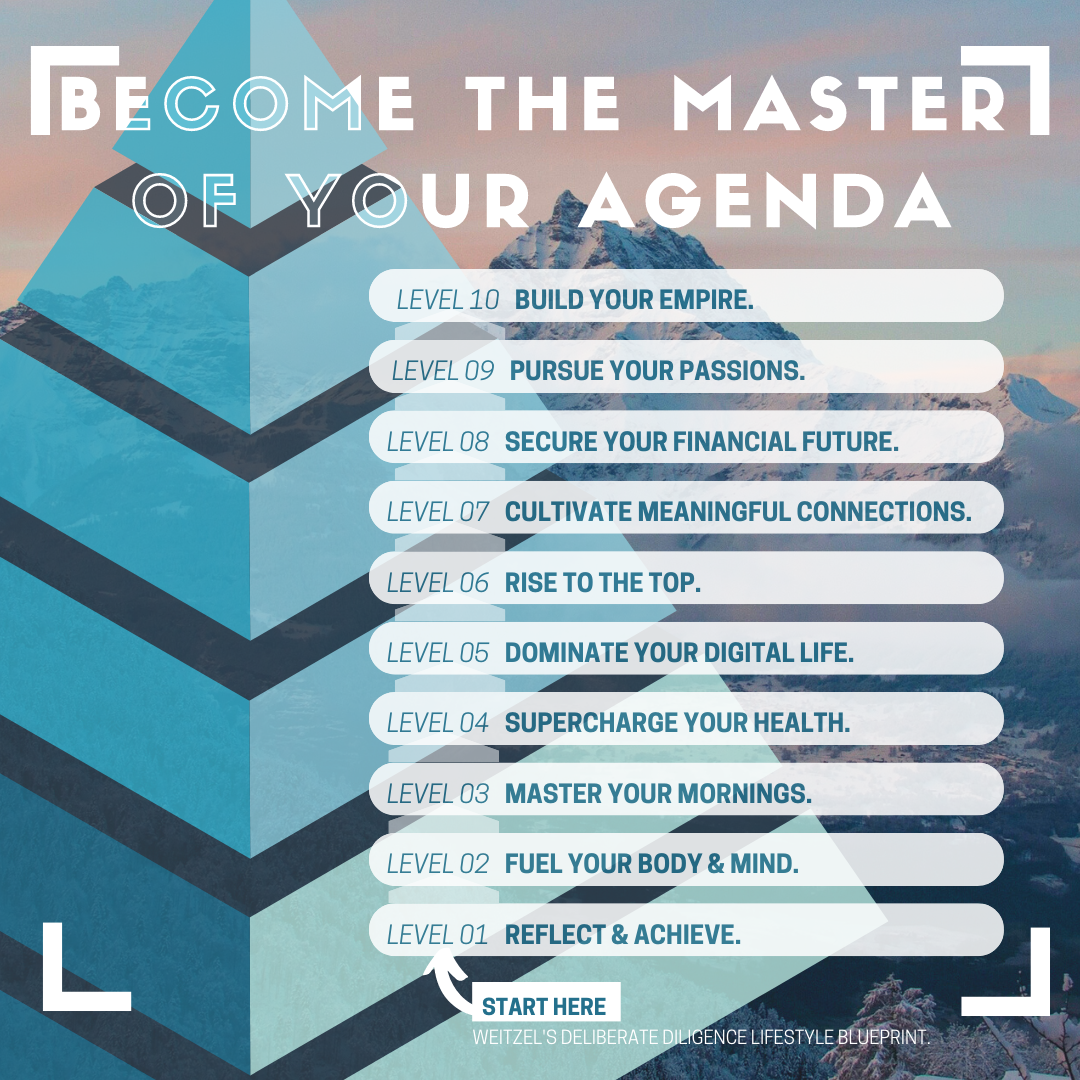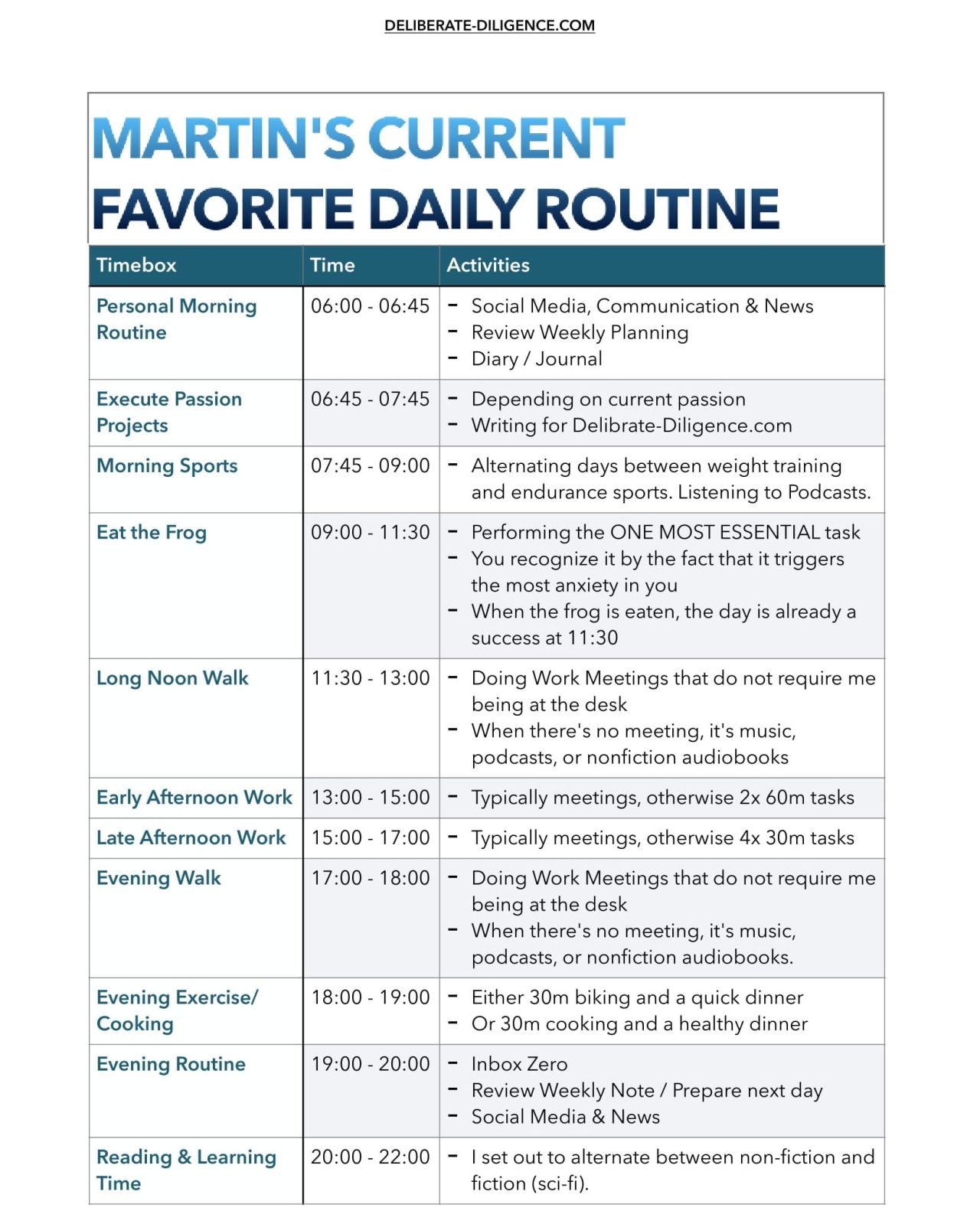Diligent Sunday Newsletter / Issue #18 about Time Mastery
Discover the power of Time Mastery and learn how to shift from mere time management to time mastery, explore strategies for prioritizing tasks and making better decisions, and find out Martin's top 10 Time Mastery methods. Don't just be efficient with your time, be truly effective in every aspect.

Introduction
Dear Diligent Sunday Readers,
Another week has passed, and we are entering the 21st calendar week with 38.5% of the year behind us. I am pretty happy with my goals and progress for this year:
- Through consistent physical activities (walks, running, bodybuilding, cycling), I have successfully shed my winter weight and feel more comfortable in my skin again.
- By being consistent in my content creation and engaging with my community, I now have a clear vision of the problem I can address with my first training course in the context of productivity. It's an area where the demand and my skills align perfectly. In the next newsletter, I will reveal the product's value proposition and release an initial Minimal Valuable Product in June/July.
By accomplishing these two goals that weighed on me during the first third of the year, I have relieved myself of those burdens and have a clear mind for innovation and leisure once again.
How are your goals coming along? Feel free to write to me via email, Twitter, or LinkedIn if you want a second opinion.
This Week’s Theme: Time Mastery
Another aspect that I'm happy with is the introduction of weekly content themes. Last week, we explored Mental Models, and the week before that, was focused on Ikigai. This weekly theme helps to align my social media posts and newsletter content more closely. The newsletter sets the theme, and I can delve deeper into the topics in the social media posts.
Today, we have another theme, and this time I asked my community for suggestions. One suggestion that caught my eye for this week came from Nuran Mammadov:

So, this week's theme is Time Management, or, since Nuran's goal is to master it, let's call it Time Mastery. This term emphasizes the elevated aspiration of making the most of the available time in our lives.
I wish you all a fantastic start to the week.
— Martin from Deliberate Diligence.com
"Time is what we want most, but what we use worst."
- William Penn
Deliberate Diligence Level 05: Dominate Your Digital Life
Topic: Time Mastery

Today at a Glance:
- 1️⃣ The Why: Only -how much do you guess?- Weeks to Spend.
- 2️⃣ The How: Time Management Is About Efficiency, Whereas Time Mastery Is About Effectiveness.
- 3️⃣ The What: My Top 10 Time Mastery Methods
- 4️⃣ Community Questions


1️⃣ The Why: Only -how much do you guess?- Weeks to Spend.
I recently read an interesting book recommendation in Colin Matson's newsletter. The book (link and description below) discusses a crucial distinction in Time Mastery: many tips and tricks focus on accomplishing as many things as possible in the least amount of time. However, what is genuinely crucial is to do the few right things within the available time.
To highlight this difference, the author often poses this question, which I will now ask you:
Intuitively speaking, how many weeks do you believe you have in your lifetime?
Most answers tend to overestimate significantly. Many people who intuitively respond to this question come up with hundreds of thousands of weeks. You may only have around 4,000 weeks in total, or if you live to be really old, perhaps 5,500 weeks.
The exercise is quite fascinating because the number is relatively small. We all know how quickly a week flies by. This is the 18th weekly edition of my Diligent Sunday, and it feels like I just started it yesterday.
I am intuitively aware of this limited capacity. When I listen to my shadow self, my ego, and delve into the origins of my drive to work towards my goals with deliberate diligence, I arrive at the answer that it stems from the fear of death and impermanence and the desire to use time in a way that makes an impact. I hope that someday, with luck, I can look back on my life and honestly say that I have utilized around 80% of my potential, which was gifted to me by nature, society, and my parents (claiming 100% would probably be too ambitious, I think).
"Time you enjoy wasting is not wasted time."
- Marthe Troly-Curtin
Therefore, I always wonder why so many people in my surroundings, especially in their 20s and 30s—when one is brimming with health and energy—tend to linger around lazily. They prefer going out partying every weekend, only to spend Saturday and Sunday "chilling." It would never occur to me to let a weekend, a time when so much can be accomplished, pass by meaninglessly. Of course, deliberate regeneration is different and perfectly okay.
But, well, everyone must choose their life model. I aim to convey with this short essay that Time Management, or Time Mastery, is not about efficiency but effectiveness.
P.S.: The book I mentioned above is Four Thousand Weeks: Time Management for Mortals by Oliver Burkeman

P.P.S. Do you want a tangible feeling for how your weeks pass? Check out the "Hourglass" template I share in this article:

“Successful people don’t see it as ‘free time.’ They see it as the only time they have to do the things they really want to do in life and they don’t take a minute for granted.”
-Nicolas Cole

2️⃣ The How: Time Management Is About Efficiency, Whereas Time Mastery Is About Effectiveness.
Time management and time mastery may seem similar, but their approaches and goals are fundamentally different.
- Time management is focused on efficiency, which means accomplishing tasks quicker, optimizing processes, and generally being more productive with your day. It's about squeezing the most out of your limited time.
- On the other hand, time mastery is about being effective with your time. This means making the best decisions on how to spend your time, focusing on essential tasks, and achieving meaningful goals. It's not just about doing things faster but doing the right things that bring value to your life.
"He who every morning plans the transactions of the day and follows out the plan, carries a thread that will guide him through the labyrinth of the busiest life."
- Victor Hugo
So, how can we transition from mere time management to time mastery? Here are some principles to guide you on this journey:
Prioritise your tasks: Focus on the tasks that are important and meaningful to you. These tasks should align with your goals and values. Prioritize your daily activities based on their impact and not urgency.
Apply "Weitzel's Razor": Think of "Occam's Razor" mental problem-solving model applied to your task management. The people I coach and observe often have overly filled task lists, with hundreds of items in total and more tasks scheduled for Monday than they can reasonably complete in the entire week. They overestimate their capacity for individual work excessively. The key is rigorously eliminating all tasks that are not on your critical path. How do you identify your critical path? It is precisely those topics that you avoid and feels a latent fear of failure. P.S.: Interestingly, this principle has no "Razor" mental model yet. Then I'll name it after myself!
Learn when to say no: Understand that you cannot do everything, and sometimes you need to say no to tasks, invitations, or demands on your time to focus on what truly matters.
Most people have a flawed mental model of "Yes" and "No".
— Martin Weitzel (@DelDiligence) May 17, 2023
Getting a definitive "no" is far superior to a vague and uncertain "yes".
- Stop saying "yes" out of politeness.
- A "no" is a focus choice, not an attack.
- After getting a "no", you can negotiate your way to a "yes".
Eliminate distractions: Find your best working environment and remove anything that distracts you from focusing on your tasks. This could be notifications, emails, or even physical clutter.

Set SMART goals: Ensure your goals are Specific, Measurable, Achievable, Relevant, and Time-bound. This will help you stay focused and motivated to reach your objectives.
Plan and schedule your time: Make a daily, weekly, or monthly plan for your tasks, and allocate specific time blocks for each task. This will help you stay organized and ensure you're giving each task the attention it deserves.

Focus on becoming a better decision-maker: Time mastery involves making the best decisions on how to spend your time. Develop your decision-making skills by learning from your experiences and seeking advice from others.
Reflect on your progress regularly: Evaluate how you use your time and whether you focus on suitable activities. Adjust your priorities and habits accordingly to optimize your effectiveness.

Practice mindfulness: Learning to be present and fully engaged in the current moment can help you make better decisions about spending your time and improving your overall mental well-being.
Embrace the power of rest: Understand the importance of taking breaks and giving yourself time to recharge physically and mentally. Rest is necessary to maintain effectiveness and creativity in the long run.
You're taking a more meaningful approach to managing your time by shifting your focus from efficiency to effectiveness. Time mastery is about finding balance and making conscious choices about spending your limited weeks in this life.
"The key is in not spending time, but in investing it."
- Stephen R. Covey

3️⃣ The What: My Top 10 Time Mastery Methods
Here are my top 10 Time Mastery Methods that I have found to be incredibly helpful in my journey towards utilising my time more effectively:
- The Pareto Principle (80/20 rule): Identify the 20% of tasks that will produce 80% of your desired results. Focus on those tasks and prioritise them over others.
- The Eisenhower Matrix: Separate your tasks into four categories - urgent and important, important but not urgent, urgent but not important, and neither urgent nor important. Focus on the urgent and important tasks first, then move on to the important but not urgent ones.
- Time blocking: Schedule "blocks" of time for specific tasks or categories of tasks, and stick to this schedule as closely as possible (but leave room for your inner flow to follow). This creates structure and eliminates the need for constant decision-making about what to work on next.
- "The One Thing" / "Eat that Frog" strategy: I only schedule one time block a day, from 09:00 to 11:30, where I tackle my single(!) most important task day. During that time block, I leave my phone in the hallway and close Outlook, Teams and other apps that generate notifications. I defend this time block as much as possible. (Learn more)
- The Pomodoro Technique: Use a timer to break your work into 25-minute sessions called pomodoros, followed by a short break. After completing four pomodoros, take a more extended break. This method keeps you focused and allows for periodic rest. (Learn more)
- The Two-Minute Rule: Do it immediately if a task can be completed in two minutes or less. This prevents small tasks from piling up and overwhelming you.
- Break tasks into smaller, more manageable tasks: Instead of focusing on an enormous, daunting task, break it down into smaller tasks that can be completed more efficiently. This makes the job seem less intimidating and allows for a sense of accomplishment as each small task is completed.
- Use technology to help manage your time: Utilise tools such as project management software, calendar and scheduling apps, and productivity systems to keep track of your tasks and priorities. (Learn more)
- Track your time spending: Check your phone's screen time statistics and be surprised about your time wasted. I use the Timelines app to track my time spent in diverse life areas manually. (Learn more).
- Create routines and habits: Establish daily, weekly, and monthly routines and habits for completing tasks and staying organised. Making these behaviours automatic minimises the mental effort required to maintain your Time Mastery. (Learn more).
"It's not enough to be busy, so are the ants. The question is, what are we busy about?"
- Henry David Thoreau

"You will never find time for anything. If you want time, you must make it."
- Charles Buxton

4️⃣ Community Questions
Question #1

This is how I handle it: I don't plan for recovery in advance; instead, I have to concentrate on recognising my state of exhaustion (emotional, mental, physical) exactly. It's like having to learn your hunger pangs first.
I rest when I realise I'm exhausted, and my "flow" leads me toward regeneration and leisure. Yesterday evening, for example, I just played the new Zelda instead of continuing to work intensively on my offer for another 2 hours as initially planned.
Has this caused any damage? Whether I get my offer a day earlier or later doesn't matter.
If I were to struggle through, it would also be noticeable in the quality of my output.
P.S.: The new Zelda game is perfect and joyful!
"Lack of direction, not lack of time, is the problem. We all have twenty-four hour days."
- Zig Ziglar
Question #2

Specific answer: I would ignore the customer if he asks at short notice or calls directly. I expect pre-arranged appointments that suit both of us, and I don't want to be torn out of my flow. It's essential to fight off distractions and time thieves.
However, I would do it if he asked for an appointment beforehand, and it was in my focus time because he had no other option. That much flexibility is necessary because the opportunity costs of rescheduling the focus time will be less damaging than the damage from the missed client meeting. After all, that's what business thrives on
General answer: I make it dependent on the consequences if I reject a request. Is there a threat of loss of reputation (e.g. when I want to be recognised for my swift reaction speed)? Will I cause unreasonable waiting times for other colleagues or the customer (chain situations)? Could I miss critical information?
If I do not want to bear the risk of adverse consequences (or unintended consequences) and do not overstretch my boundaries too much, then I will do it.
"The bad news is time flies. The good news is you're the pilot."
- Michael Altshuler

That's it for this week! I wish you a purposeful and inspiring start to the 20th week of the year!
Feel free to add tips and thoughts to this page's comment section, Twitter or LinkedIn!
Best regards,
-- Martin from Deliberate-Diligence.com


Discussion